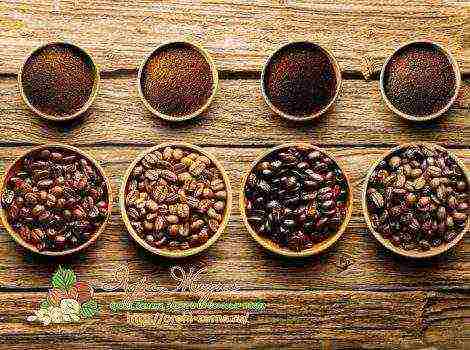Content
.
Grapes have been cultivated for a long time. Even in Ancient Rome and Ancient Greece, wines were made from the muscat varieties of the vineyard, the taste of which was considered divine. In the Middle Ages, these varieties of Muscat table grapes began to be cultivated in countries such as Italy and France. And from the beginning of the 19th century, these types of grape crops began to be grown on the territory of our country, in the Crimea. It is there that there are still the best Muscat table vineyards with a pleasant smell and taste of Muscat. Why, then, thanks to this taste, a number of grape varieties have been distinguished, which are cultivated in different countries of the world?
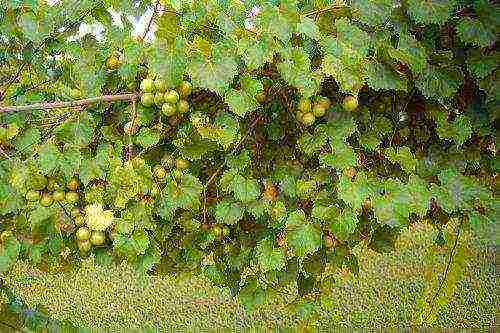
Muscat grapes have a special flavor
General properties of nutmeg varieties
The taste of musk is given to the berries of this culture by special compounds called thornoids. They are found in the skin and the adjacent pulp. Berries with a musky aroma are pleasant to the taste, sweeter than fruits of other varieties. These fruits, thanks to the phytoncides included in their composition, have a beneficial effect on the state of the intestinal microflora.
One can only regret that this type of table grapes is very little represented on the shelves of our stores.
Unfortunately, most table grape varieties are not resistant to frost and fungal diseases. Therefore, it is extremely difficult to grow them in garden plots.
Thanks to the efforts of breeders, new types of this table grape crop are now emerging that are not afraid of frost, are resistant to fungal diseases such as downy mildew (mildew) and powdery mildew (odium). Such varieties as Khrustalny, Donskoy or Krasny are distinguished by increased resistance to frost, as well as resistant to mildew and odium.
The Amber Muscat variety was bred by breeders specifically for the Central Asian regions. It is distinguished by a higher yield, a higher percentage of sugar in berries than in other types of vineyards.
Therefore, it is worth talking about the main popular types of nutmeg table grapes.
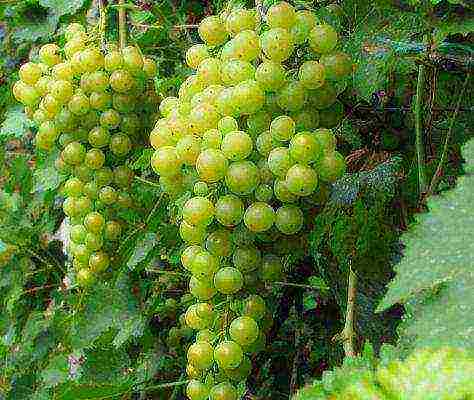
Amber table nutmeg produces berries with a high sugar content
White view
Arabia and Egypt are considered the birthplace of the White Vineyard. Today it is actively cultivated in European countries located on the shores of the Mediterranean Sea - Romania, Bulgaria, France and some others. It takes root well only in warm climatic zones on loams. Usually, when planting seedlings of these grape bushes, pebbles are added to the holes for better soil drainage.
The ideal site for planting seedlings of the White Vineyard is a rocky slope that is illuminated by the sun throughout the day. For feeding this crop, it is necessary to use fertilizers containing potassium. The introduction of these fertilizers is especially effective from the beginning of the ripening of the crop.
Brushes of this type have a cylindrical shape, its mass can be from 100 to 440 g.
Main characteristics:
- fruits are round, not large;
- the pulp is tender and sweet with a distinct smell of musk;
- the percentage of sugar in berries is up to 30%.
This vineyard got its name for the peculiar waxy color of the fruits in the bunches. The bushes grow very well over the season. The berries ripen in 4.5 months, with 9/10 of the brushes on the vine fully ripening. However, the yield of this grape is average. Harvesting is carried out in the third decade of September, in this case, more sugar accumulates in the fruits.
Dessert wines, sparkling dessert wines, juices are made from white grapes. This vineyard is not resistant to fungal diseases and is often infested with pests.Not resistant to cold snaps, especially frosts in spring. Lack of moisture in the soil is the reason for the weakening of the shoots.

White Muscat is used for making wine and champagne
Novoshakhtinsky Muscat
It is a hybrid variety obtained from crossing the Talisman vineyard and XVII-10-26. The bunches ripen quickly enough - in almost 4 months. The inflorescences are self-pollinated. Ripening of the vine is almost 100%. The weight of one brush can be 600 g. Fruits are purple with a red tint, round, the weight of one berry is up to 10 g. The peel of the berries is thin, not felt when eaten fresh.
The variety is resistant to frost, moderately resistant to diseases. This table grapes are distinguished by high productivity, the brushes can be on the shoots for a long time after ripening, without losing their presentation and taste. Well transported.

Novoshakhtinsky nutmeg produces fruits of a pale purple color
Donskoy
It is distinguished by early ripening of berries (less than 4 months). This variety was bred in the middle of the last century, but these grape bushes are still grown in gardeners' plots. Bushes grow quickly and actively. The brushes are small in size, their weight fluctuates around 200 g. The amount of sugar in the berries is high - up to 30%. The maturation of the vine is no more than 50%. Berries are dark blue, medium-sized.
Of the diseases, phylloxera is most often affected. Differs in high resistance to cold, can withstand temperatures as low as -30 ° C. This nutmeg grape is unpretentious to different types of soil, quickly gets used to any type of soil. The fruits appear already in the 3rd season.
In this vineyard, more bunches are often ripening than necessary, so you should thin out the bunches from extra berries.
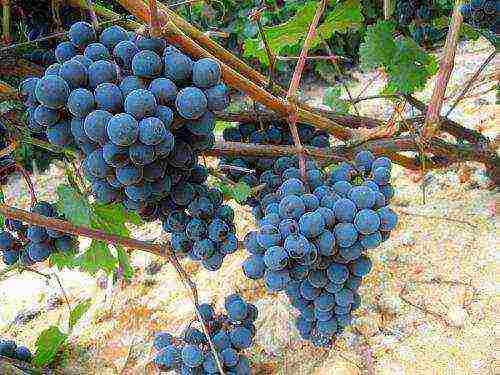
Donskoy Muscat belongs to the early varieties
Pleven nutmeg
This is a table grape grown in Bulgaria. The bunches mature in less than 4 months. Each bunch can weigh no more than 600 g. The fruits are oval, amber in color, the size of berries is about the size of a 1 ruble coin. The amount of sugar in fruits is up to 20%. The maturation of shoots is relatively high - up to 84%.
This nutmeg grapes ripens quickly enough (no more than 4 months). After planting seedlings, the harvest begins to be harvested from this grape crop in the third year. Frost-resistant, relatively resistant to fungal diseases.
With frequent application of fertilizers under the vines, you can get larger grape clusters with large berries.
Pleven fell in love with gardeners for the excellent quality of the fruit and ease of caring for grape bushes.
These grape bushes with a taste of musk enjoy well-deserved success among gardeners for the high characteristics of the berries, for the excellent varieties of wines that are made on their basis. And the emerging new hybrid species of these vineyards make it possible to grow them in central Russia, as well as in more northern regions.
Subscribe Be aware of new products on our site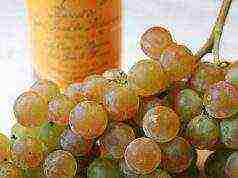
Muscat is one of the oldest known grape varieties. Today, a number of Muscat varieties and hybrids with different characteristics are known under this name. The grapes are grown both for fresh consumption and for making wine. All varieties have one common feature - a wonderful taste and smell of nutmeg.
Muscats are distinguished by their yield, excellent ripeness and excellent transport tolerance. The berries are dense, tasty, with a fleshy juicy pulp. Grapes retain their taste and nutmeg aroma for up to 2-3 months.
The grapes are native to Central Asia, so they do not tolerate cold weather and require a lot of sun to ripen. However, today breeders offer varieties that can tolerate significant frosts, are resistant to mildew and sulfur rot, and have time to mature in the short northern summer.
Peculiarities
The Muscat grape, according to the manuscripts, was known even in Ancient Rome and Greece. The berry was usually used to make wine, since the nutmeg flavor gave it a completely unique aroma and taste.
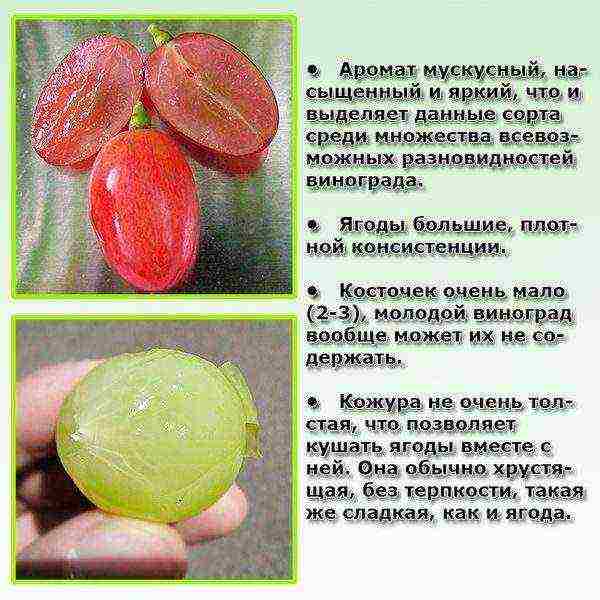 Features of Muscat grapes
Features of Muscat grapes
Muscat note is a specific feature of the variety. It is provided with thorny compounds found in the skin of the berry and in the pulp next to the skin. Substances appear only at the stage of full ripening of the grapes.
Muscat is not a plant variety, but a whole group of hybrids, which are united by a common feature - a special smell and taste of nutmeg. The variety originates from Central Asia, today it is grown in all countries of Europe and Asia with a suitable climate: France, Spain, Italy, Crimea. There are both table varieties, intended for fresh consumption, and technical ones, used for the superiority of wine.
In fact, fresh Muscat grapes are consumed regardless of the variety. When ripe, the berry picks up a lot of sugar - from 15 to 25%, and the nutmeg flavor gives it extraordinary attractiveness.
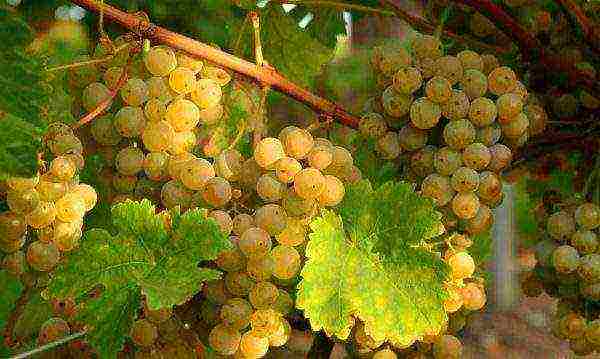 The history of Muscat grapes goes back several millennia. It was grown in ancient Rome.
The history of Muscat grapes goes back several millennia. It was grown in ancient Rome.
The undoubted advantages of nutmeg varieties include:
- high sugar content berries with sufficient acidity - from 19 to 33%, which allows you to get incomparable wines in their qualities;
- excellent taste of fresh berries, wonderful nutmeg aroma;
- excellent phytoncidal properties, causing a noticeable improvement in the work of the digestive tract;
- good yield and the excellent appearance of the berries.
There are also very significant disadvantages of the variety:
- grapes of this group are not very resistant to fungal diseases. The vineyard must be constantly treated with special preparations;
- alas, nutmegs are designed to be grown in warm countries: they have low frost resistance and require a large number of sunny days to ripen.
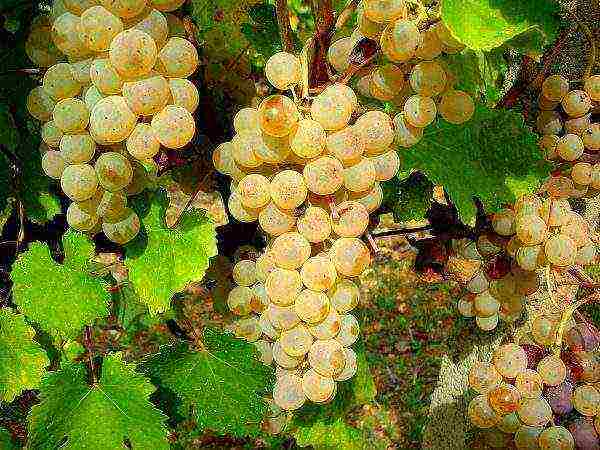 It is believed that wines from these varieties have a unique aroma and a pleasant, bright taste.
It is believed that wines from these varieties have a unique aroma and a pleasant, bright taste.
Breeders are constantly trying to develop nutmeg varieties that are devoid of these shortcomings. Today, there are types of grapes, for example, Shatilova White Muscat, which can be grown in the Urals.
Varieties
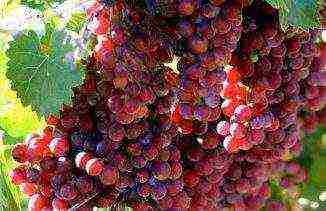 There are a huge number of nutmeg varieties with a wide variety of characteristics. This variety allows you to choose grapes for growing in a variety of conditions and on different soils. It should be borne in mind that the higher the resistance to frost or fungal diseases, the lower the technical characteristics of the variety. For fresh consumption, this does not really matter, but for the production of wine it is an insurmountable obstacle.
There are a huge number of nutmeg varieties with a wide variety of characteristics. This variety allows you to choose grapes for growing in a variety of conditions and on different soils. It should be borne in mind that the higher the resistance to frost or fungal diseases, the lower the technical characteristics of the variety. For fresh consumption, this does not really matter, but for the production of wine it is an insurmountable obstacle.
Hamburg
A classic inhabitant of warm countries. It is widespread in Spain, France, grown in the Crimea, and also in California. Grapes were bred in England and for a long time was considered a greenhouse variety.
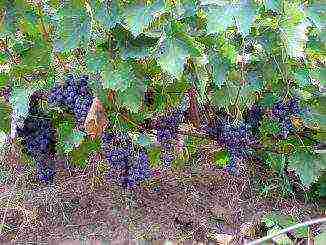 Bushes of Hamburg or Black Muscat reach medium height, are characterized by creeping shoots and a tendency to form a large green mass. The grapes must be pruned constantly. Young vines are green, ripe - reddish-brown, on average, up to 67% of fruitful vines are on the bush. The leaves are large, wavy, covered with a dense downy bottom.
Bushes of Hamburg or Black Muscat reach medium height, are characterized by creeping shoots and a tendency to form a large green mass. The grapes must be pruned constantly. Young vines are green, ripe - reddish-brown, on average, up to 67% of fruitful vines are on the bush. The leaves are large, wavy, covered with a dense downy bottom.
The bunches of the Hamburg variety reach 20 cm in length and weigh from 170 to 260 g. The shape is conical, but the bunch is loose, which makes harvesting somewhat difficult. Berries - round or oval, up to 16 mm in diameter and weighing up to 4 g. Color - black with a well-visible waxy bloom. The skin is quite tough, but the flesh is fleshy, juicy and has a pronounced flavor of nutmeg. It takes 140-150 days before ripening.
The Hamburg variety is usually grown as a table variety. The berries are perfectly stored without losing their taste for 3 months, and they tolerate transportation very well. However, amateur winegrowers use grape raw materials to make wine.
 The Muscat Hamburg grape has been sectioned, despite its name, in the UK as a greenhouse variety.
The Muscat Hamburg grape has been sectioned, despite its name, in the UK as a greenhouse variety.
The variety is demanding on heat, has low frost resistance and is not grown in mid-latitudes. At a temperature of -19 C, the plant loses up to half of its eyes, so for the winter the grape bush must be wrapped completely.
Hamburg Muscat is prone to phylloxera, "willingly" suffers from mildew, oidium, gray rot. Caring for it takes effort and patience.
The yield of the variety varies widely. Under favorable conditions, you can get 70–120 centners per hectare. However, these indicators are highly volatile and difficult to count on.
Pink
It is considered a young variety, although it was born, as it is believed, more than 200 years ago. Pink Muscat is grown in France, Italy, Armenia, as the variety is very thermophilic. But grapes are not very picky about the soil and tolerate drought well: the plant is watered 4 times a year. 
The bushes are medium-sized, planted in mid-April-May. They develop at an average pace, so they do not need frequent pruning. The vines are light brown, with dark nodules, the leaves are dense, five-lobed, smooth above, and with a light bristle below.
The bunches reach an average size and weigh up to 200 g, but they are dense, conveniently cylindrical in shape. The berries are dark red with a waxy bloom, large - 11–18 mm in diameter. The skin of the berries is thin, the pulp is very juicy and very sweet - the sugar content of ripe grapes reaches 35%. The characteristic nutmeg flavor adds piquancy to them.
The variety is classified as medium early, ripens in 135-140 days. Average yield - 60-80 centners per hectare. Berries are used both fresh and for making wine or jam.
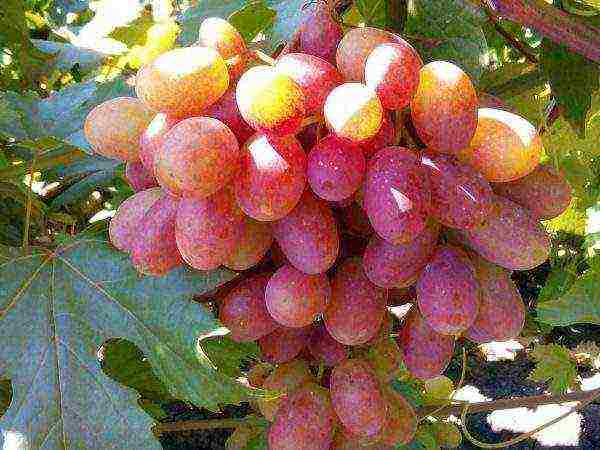 Pink Muscat grapes quickly accumulate sugar, its berries have a crispy firm pulp, balanced bright taste and aroma with a nutmeg hue.
Pink Muscat grapes quickly accumulate sugar, its berries have a crispy firm pulp, balanced bright taste and aroma with a nutmeg hue.
Rose Muscat is used to produce the highest quality wine. Thus, the grapes grown on the southern slopes of the Crimea are entirely used to obtain valuable wines.
Pink nutmeg does not tolerate cold well, is sensitive to excess moisture - the berries rot and crack during heavy rains. In addition, the variety is prone to phylloxera, mildew and powdery mildew. However, due to earlier ripening periods, many other diseases can be safely avoided.
Blau
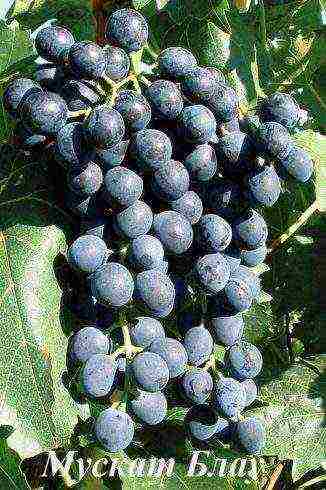 Swiss selection of Muscat grapes, distinguished by the most valuable quality - frost resistance. The grapes can withstand cold temperatures down to -30 C. In addition, Blau is distinguished by a short ripening period, which makes it possible to get berries even in the short northern summer.
Swiss selection of Muscat grapes, distinguished by the most valuable quality - frost resistance. The grapes can withstand cold temperatures down to -30 C. In addition, Blau is distinguished by a short ripening period, which makes it possible to get berries even in the short northern summer.
Vine bushes are medium-sized, medium-sized leaves, dense. The vine is sensitive to stress, so timely, careful pruning is a must for growing.
Bunches of medium size, but dense and reach a mass of 260-300 g. Berries are medium - weighing up to 4 g, with excellent taste. Usually grapes are used to make red muscat wines, however, they are more than suitable for fresh consumption.
Blau is quite resistant to fungal diseases and does not require such a thorough and numerous spraying. However, you should not give up the preventive treatment of grapes. The variety is also quite indifferent to the composition of the soil: the main thing is a sufficient amount of fertilizers, which is easily solved with the help of top dressing.
 Despite the widespread belief that Muscat grapes are extremely capricious and extremely difficult to grow, Muscat Blau is knocked out of this list in several ways.
Despite the widespread belief that Muscat grapes are extremely capricious and extremely difficult to grow, Muscat Blau is knocked out of this list in several ways.
Blau's real disaster is the wasps. Insects love sweet berries and can significantly reduce yields. Bushes during the ripening period have to be protected with special nets and traps for wasps should be placed around the grapes.
Medium early grapes, ripens in 135-140 days. The yield is average. The number of sunny days has little effect on the indicators, but fertilization and watering can increase yields.
Amber
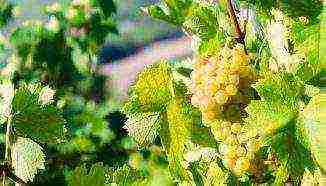 Typically a table variety with an optimal ratio of sugar content - 22-25%, and acidity - 16-18 g / l. It is distinguished by excellent transportability and perfectly tolerates storage - it does not lose its taste for more than 3 months.
Typically a table variety with an optimal ratio of sugar content - 22-25%, and acidity - 16-18 g / l. It is distinguished by excellent transportability and perfectly tolerates storage - it does not lose its taste for more than 3 months.
Amber Muscat bushes are medium-sized, with medium rounded leaves, almost whole. The vine is light brown with dark nodes. Even annual shoots ripen - up to 90%. The bushes tolerate the load well: when pruning, they leave up to 6-7 eyes.
Bunches of amber Muscat are cylindrical in shape, relatively small - up to 17 cm long, but reach a mass of up to 340 g. Berries, round, less often oval, grow up to 17 mm in diameter. The skin of the grapes is dense, but tasty, the pulp is very juicy and very sweet. The color of the berries is greenish-yellow, really amber, from the sunny side it becomes golden.
 Muscat amber Table variety of European origin, Central Asian and Moldovan selection.
Muscat amber Table variety of European origin, Central Asian and Moldovan selection.
Amber Muscat belongs to early ripe and becomes suitable for consumption after 107-115 days. This feature allows grapes to be grown in the short northern summer.
The variety is sensitive to mildew and powdery mildew, so spraying the vineyard cannot be avoided. But amber Muscat is not prone to decay and cracking of berries.
Superearly red
The variety was bred in Moldova and represents an excellent work of breeders. Grapes not only tolerate frosts well - down to -23 C, but are also resistant to mildew, powdery mildew and completely insensitive to gray rot. Muscat varieties can rarely boast of such advantages.
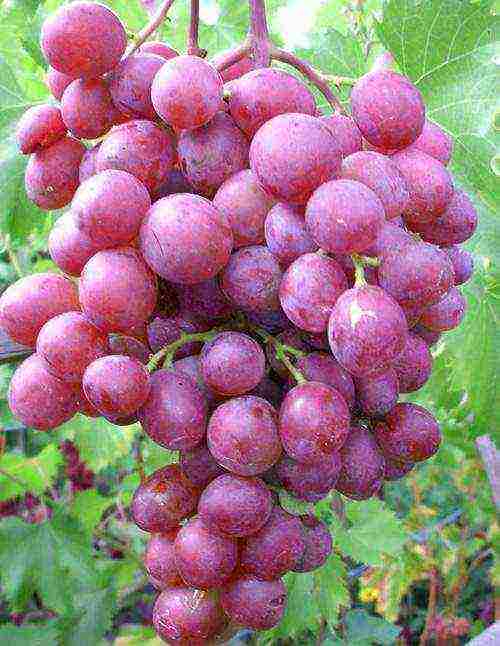 The grape variety "Supershearly Red Muscat" is characterized by the presence of red shoots, its leaves are green.
The grape variety "Supershearly Red Muscat" is characterized by the presence of red shoots, its leaves are green.
The variety is called a very early variety for a reason: the ripening period is only 95-101 days, so the berries can be removed already in July. Early maturity allows the grapes to avoid many diseases and to ripen during the short summer.
Bushes of plants are medium or tall, the green mass is abundant. Leaves are dense, medium-sized, rounded and almost whole. On average, 1.3 clusters are formed on each shoot.
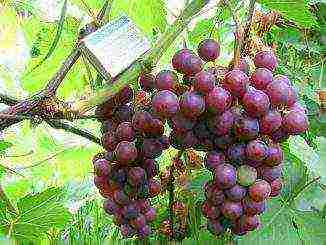 Bunches of red Muscat can serve as an example of a presentation: large, medium-dense, weighing 300-400 g, have a regular, cylindrical shape. The berries, round or oval, grow up to 20 mm in diameter. The color of the grapes is juicy, red, becoming more and more purple when ripe. The pulp is fleshy, crunchy, the nutmeg flavor is distinctly felt. The sugar content of the berries is slightly lower - 18–20%, which is more than enough for table grapes.
Bunches of red Muscat can serve as an example of a presentation: large, medium-dense, weighing 300-400 g, have a regular, cylindrical shape. The berries, round or oval, grow up to 20 mm in diameter. The color of the grapes is juicy, red, becoming more and more purple when ripe. The pulp is fleshy, crunchy, the nutmeg flavor is distinctly felt. The sugar content of the berries is slightly lower - 18–20%, which is more than enough for table grapes.
Due to the low sugar content, the variety does not attract wasps, which allows you to completely preserve the harvest.
Another feature of red Muscat is its excellent keeping quality. The bunch can be left on the vine for up to a month: the berries will not crack, rot, or overripe. Plucked grapes retain their taste for more than 3 months, which allows the longest transportation.
The yield of the variety is average. Berries are best eaten fresh.
Dievsky
Excellent table variety with very large berries. Received from Kiev Muscat by amateur gardener A. A. Golub... It tolerates frosts down to -23 C, but in colder winters, the bushes should be completely covered. In addition, grapes are undemanding to the soil, tolerates drought and moisture well, as they are not prone to decay.
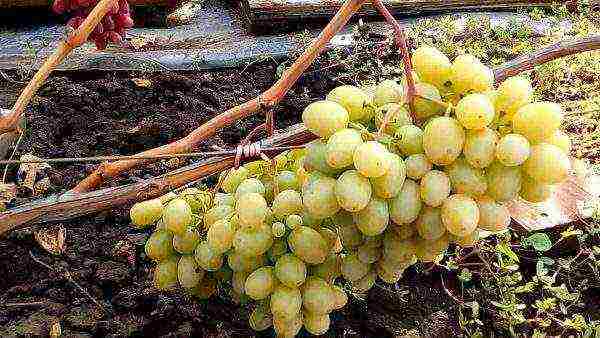
Experts who have been growing grapes for a long time prefer popular varieties, including the Dievsky Muscat variety.
The grape bushes are vigorous, strong, the vines ripen in the first year. Leaves are medium in size, five-lobed, poorly cut.
Bunches of Diyevsky nutmeg reach a weight of 600–800 g. Large, cone-shaped, they lie perfectly, are stored and endure transportation without losing either taste or appearance. The berries are oval, amber-green in color, they are large in size - they reach a length of 4 cm and weigh from 17 to 20 g.The berries are not prone to peas, therefore, even in the most unfavorable weather, they remain large and juicy.
The sugar content of the grapes reaches 22%, the acidity is 5–7 g / l. The taste is very harmonious, with soft nutmeg notes. Berries are best eaten fresh or used for preservation. The grapes ripen early - in 115-120 days. So the harvest can be taken already in mid-August.
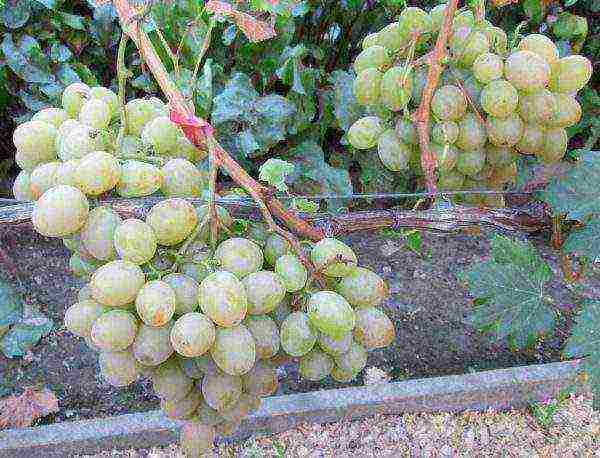 The variety has a high yield - 120 centners per hectare. But, however, the indicators depend on the weather: rains do not contribute to full ripening.
The variety has a high yield - 120 centners per hectare. But, however, the indicators depend on the weather: rains do not contribute to full ripening.
Dieva Muscat needs frequent and careful pruning. The average load on the bush is 45 eyes and it is not recommended to exceed this figure. Moreover, overloaded vines must be pruned before ripening, otherwise the berries will not reach their intended size.
What else is attractive about this variety is its resistance to fungal diseases. It is not absolute, of course, but the resistance of grapes to mildew, gray rot, and powdery mildew is 3.5–4 points. The plant is also resistant against insects: the dense skin does not allow the wasps to get to the pulp. And from other parasites, like the grape aphid or spider mite, the culture is protected in the usual way - with pesticides.
Livadia
One of the most successful table grapes for a beginner. Despite the fact that the variety is traditionally thermophilic, it is able to withstand cold temperatures down to -21 C, it tolerates drought well and gives an excellent harvest. "Favorite" soils of Livadia are light sandy and sandy loam, but in general the plant is not picky.
 Since 1892, a two-year-old wine of the same name has been produced from the Livadia Muscat variety in the Crimea.
Since 1892, a two-year-old wine of the same name has been produced from the Livadia Muscat variety in the Crimea.
Livadia has excellent resistance to mildew, gray rot, powdery mildew and even phylloxera. This is one of the few nutmeg varieties that is so resistant and does not require constant fungicide treatment. The load on the bush should not exceed 35 eyes: very large clusters require a lot of nutrients.
Bushes of medium height, flowers are bisexual. The leaves are quite dense, five-lobed, well cut. The bush does not give an abundant green mass.
But the bunches of the plant deserve special praise: the average weight is 500 g, the maximum is 800, and it is quite easy to achieve it. Berries of medium size, elongated, very beautiful amber color. The skin is thin, but dense - wasps try to attack grapes, but cannot cope. The pulp is very juicy and unusually tasty: according to the tasting scale, Livadia reaches 9.5 points out of 10.
Overweight people can also eat berries: despite the sweet taste, the sugar content of ripe grapes is a maximum of 19%, and the acidity is 5-6 g / l.
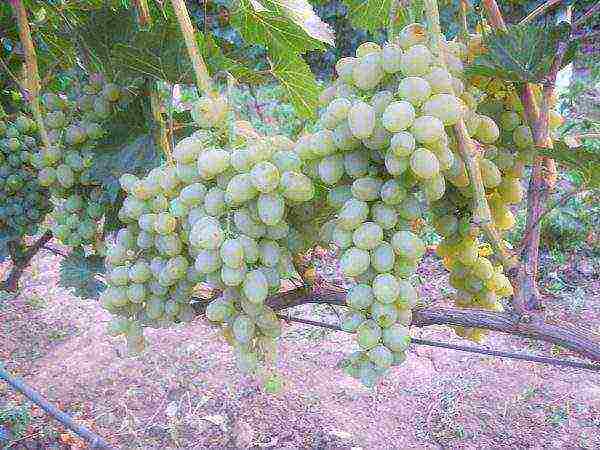 The variety is characterized by field resistance to phylloxera, mildew, gray rot, powdery mildew and can withstand frosts up to 240C.
The variety is characterized by field resistance to phylloxera, mildew, gray rot, powdery mildew and can withstand frosts up to 240C.
Early ripe variety - 110-115 days, so you can taste the grapes by the end of July. The harvest is excellent: in a hot sunny summer, 120–150 centners are removed from 1 hectare. However, weather conditions noticeably affect both the yield and taste: with a lack of sun and heat, the sugar content decreases, and the grapes acquire a sour taste.
Pleven
A Bulgarian selection that takes root well in central Russia. Table grapes have good taste. Begins to bear fruit 3 years after planting.
The Pleven bush is tall and vigorous, the vine is powerful, woody quickly. The average load on a bush is 35–45 eyes. Usually, no more than 2 bunches are left on each shoot.
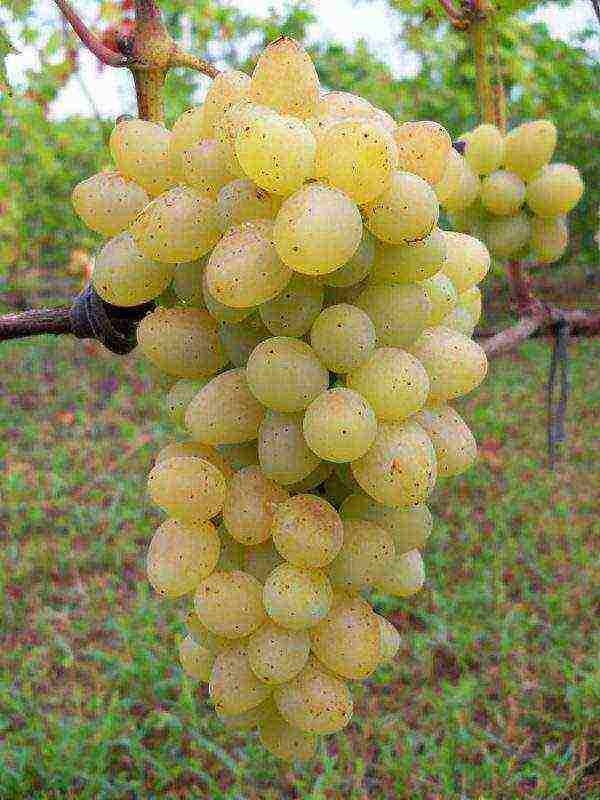 The taste of such grapes is called "truly grape" (this is when the sourness is felt in the taste and at the same time good sugar).
The taste of such grapes is called "truly grape" (this is when the sourness is felt in the taste and at the same time good sugar).
The bunches are conical, rather large, the average weight is 550-650 g. The bunches are loose, which allows the berries to ripen evenly... Grapes with dense juicy pulp are very tasty: sugar content reaches 17-22%, and acidity - 6-8 g / l. The nutmeg flavor is very well expressed.The color is golden-amber, from the sunny side it becomes bright yellow when ripe.
Pleven is able to accumulate the right amount of sugar even in the wettest summer. This feature guarantees the preservation of the flavor of the berries. At the same time, the grapes are not prone to peas.
Pleven is frost-hardy - withstands cold up to -25 C. Not particularly picky about soils, but has a very average resistance to diseases. Vineyards must be treated with fungicides at least 2 times a year.
The ripening period of Pleven is 110-115 days. The harvest is excellent - up to 140 centners per hectare, but in order to get the entire harvest in safety, you will have to wage an implacable struggle with wasps and birds, which are very eager for sweet berries.
Paradise
Young Muscat variety, also obtained by A. A. Golub. A table variety with an early ripening period and good frost resistance - up to -23 C. The characteristics of the variety are still being refined.
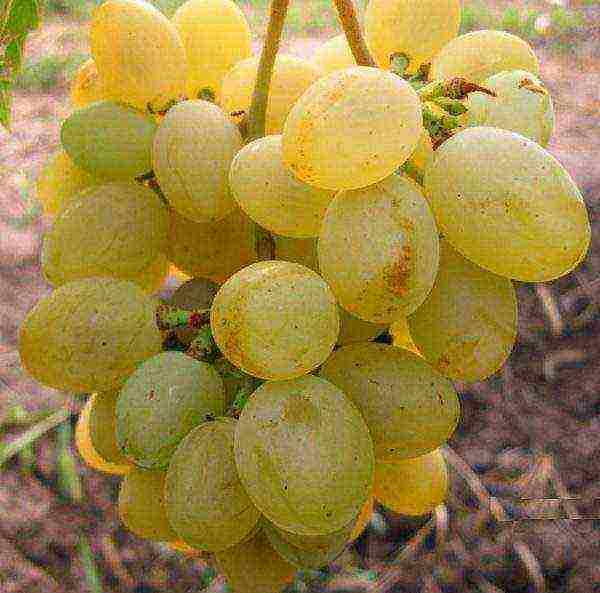 Muscat paradis is a new table form of grapes, therefore, all the declared characteristics are checked and studied in amateur vineyards in many regions of Russia and abroad.
Muscat paradis is a new table form of grapes, therefore, all the declared characteristics are checked and studied in amateur vineyards in many regions of Russia and abroad.
The grapes ripen in 95-100 days after the appearance of the ovary. It is one of the earliest varieties of nutmeg. However, the ripening time is influenced by weather conditions.
The bushes of the plant are vigorous, the vine is light brown, developed. The bunches are large up to 800 g in weight, loose, of irregular conical shape. The average weight of berries is 14–17 g, and peas are not observed even under the most unfavorable conditions. Color - white-green, turns pinkish when ripe. The shape is oval, with an elongated tip.
Grapes are not afraid of wasps, as the dense skin and pulp perfectly protects the berries. In addition, the variety is resistant to typical grape diseases: powdery mildew, mildew, gray rot.
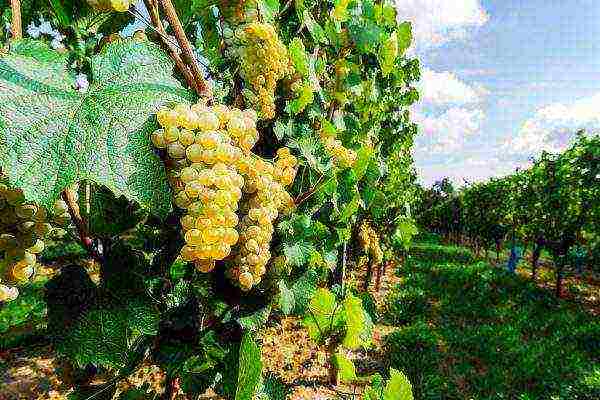 Even in a rainy summer, the berries do not rot or crack. The pulp is firm, fleshy, sweet taste with light Muscat notes.
Even in a rainy summer, the berries do not rot or crack. The pulp is firm, fleshy, sweet taste with light Muscat notes.
Another novelty among the nutmeg hybrids of A.A. Golub. A table variety intended not only for fresh consumption, but also for transportation over long distances and for storage.
The crystal does not lose its taste for more than 3 months. Even after six months of storage in the refrigerator, the flesh remains crispy, and the nutmeg notes are pronounced.
The bushes are medium-sized, with well-developed vines, the leaves are medium-sized, five-lobed, very dense. A bristle is felt on the inside. The bunches are not the largest - 600 g, medium density, the berries hold tightly to the stem.
The berries themselves grow up to 10-16 g, and in the most unfavorable conditions, they are not prone to rotting and cracking. Very beautiful color - deep red with a purple tint, does not darken when ripe. The shape of the grapes is oval-elongated with a rounded tip, somewhat reminiscent of "Ladies fingers". Both the skin and the pulp are very dense, juicy, crunchy and retain this feature during long-term storage.
The rest of the characteristics of the variety are being specified.
Video
This video will tell you which grapes are best for growing.
conclusions
- Muscat refers to a group of nutmeg varieties, differing in one common feature: the characteristic taste and smell of nutmeg.
- In general, nutmeg varieties are very thermophilic. and are not very resistant to fungal diseases. But thanks to the work of breeders, varieties that are both frost-resistant and insensitive to diseases have been bred.
- Any nutmeg grape has a high taste characteristics: on a tasting scale, their quality is rated from 7.5 to 9.5 out of 10 possible.
- Most varieties have excellent yields, large beautiful berries and very marketable bunches.
- The pulp of the berries is juicy, but fleshy and dense. The grapes perfectly tolerate transportation and are perfectly stored without losing their taste.
- Table nutmeg grapes are more often grown in private household farms. for the sake of its great taste.Technical grapes are first-class raw materials for the production of the highest quality wines.
Muscat grapes - a large group of grape varieties, from the cultivated grape species. It has a rich nutmeg aroma, which is where the name comes from. Grown in warm countries around the globe. The article will describe the features of nutmeg varieties, the most famous varieties, as well as the methodology for their cultivation.
Features of Muscat grapes
The history of Muscat grapes goes back several millennia. It was grown in ancient Rome. It combines several varieties of different types. Of course, the external qualities of Muscat grapes depend on the specific variety, but there are also common features.
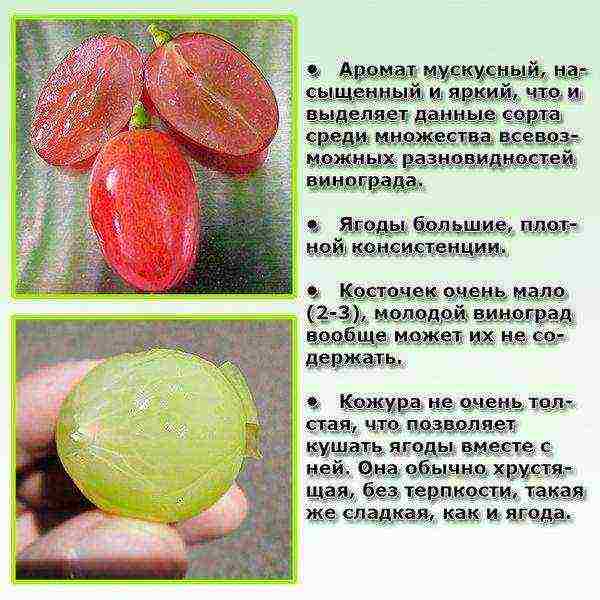 Features of Muscat grapes
Features of Muscat grapes
- The aroma is musky, rich and bright, which distinguishes these varieties among many different varieties of grapes.
- The berries are large, dense in consistency.
- There are very few seeds (2-3), young grapes may not contain them at all.
- The peel is not very thick, which allows you to eat the berries with it. They are usually crunchy without astringency, as sweet as the berries.
This grape variety belongs to the table and technical direction. It is often eaten fresh, desserts, juices are made from it, but it is also used for making wine. It is believed that wines from these varieties have a unique aroma and pleasant, bright taste.
Today Muscat grapes are grown all over the world, but the largest plantations and production scales are concentrated in France, Spain, Italy, Portugal - in these sunny countries, the cultivation of Muscat has become a kind of tradition.
Important! The composition of nutmeg grapes contains an abundance of amino acids and trace elements, potassium, calcium, but it is not caloric. Therefore, it is useful and even necessary to use it fresh if there are no contraindications.
Despite the benefits of Muscat grapes for the human body, it cannot be eaten with food allergies and diabetes mellitus due to the large amount of sugar in the composition and the irritating effect of the juice on the walls of the stomach and intestines.
The best Muscat grapes  Hamburg grape variety
Hamburg grape variety
The Muscat grape has a wide range of uses. Due to the high demand, it is grown in large quantities in many countries, and breeders invent new varieties every year, but not all breeders' experiments end successfully. And how, then, to navigate? In order to grow good grapes, you should choose only the best varieties, all of them are presented in the list below.
- "Hamburg" - mid-season variety, ripens in 145-150 days. The average yield is 110 kg / ha. Bunches up to 270 g, not very loose. The berries are not large, 3-4 g each, blue-violet with a bloom on the peel. The taste and aroma are nutmeg, the skin is dense, which has a positive effect on transportability, the juice is colorless. Sugar in 100 ml of juice - 22 g. Withstands frosts only up to -18 degrees, therefore it is grown exclusively in warm, southern countries. Often attacked by diseases and pests.
- "Alexandrian" - Muscat grapes of late ripening. The bunches are loose, conical, reaching 700 g, the berries are 6-8 grams. The color is amber-yellow, the shape is oval. The taste is sweet, nutmeg, the berries are very aromatic. It has low frost resistance and is often affected by diseases.
 Alexandria grape variety
Alexandria grape variety - "Pleven Muscat" Is an interesting grape variety that can boldly claim to be the best. Berries up to 8 grams, bunch weight does not exceed 800 g. The main positive quality is a very strong nutmeg flavor and aroma. There is resistance to bad climatic conditions.
- "Brilliant" - popular among gardeners Muscat grapes. Has a delicate, nutmeg aroma, not too strong. Berries are dense, crunch when biting off, weighing 6-8 g. Color pale pink. It is not afraid of diseases, but has low frost resistance.
- "Frumoasa Albă" or "White Beauty", as it is usually called by the people.The color of the berries is golden, weight up to 8 g. It has excellent commercial qualities, the berries are beautiful, one to one, even, they lie for a long time without spoiling, even in the heat. The weight of the bunches is on average 500 g.
- "Summer Muscat" ripens in 120 days on average. The plant is vigorous. Cylindrical brushes, 600-700 grams each. Berries are dense, elongated, amber in color, weighing up to 8.5 g. Sugar content up to 20%. Winter hardiness up to -23 degrees. Resistant to mildew and powdery mildew.
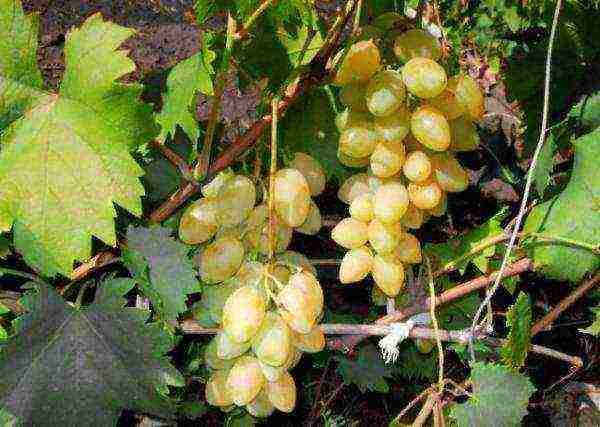 Summer Muscat grape
Summer Muscat grape - "Livadia" - a variety of early ripening. The plant does not develop very quickly. Bunches are slightly loose, large, up to 550 g. Berries are dense, with a strong skin, greenish-yellow color, sometimes golden when overripe. Delicious, crispy, high in juice and sugar. It is moderately resistant to diseases of all possible types and easily tolerates frosts down to -21 degrees.
- "Pink" - ripens in 140 days. Bunches are cylindrical, small up to 250 grams. The berries are round, maroon with a pronounced nutmeg aroma. There is a bloom on the peel. The variety is transportable, but does not lie for very long. The disadvantage of this Muscat grape is its low frost resistance and tendency to all kinds of diseases.
How to plant Muscat correctly?
Planting Muscat grapes is not very difficult - everything is the same as with an ordinary vineyard. For individual seedlings, it is necessary to dig holes. If it is a seedling that is planted, and not a stalk, then a hole is dug about 80x80x80 cm, if cuttings are planted, then they can also be planted in rows at a distance of 1-1.5 meters from each other.
 Pleven Muscat grape variety
Pleven Muscat grape variety
A peg is placed in each pit - the original support of the vineyard. At the bottom, it is worth making a drainage of 5-10 cm, from gravel or crushed stone, but only on condition that the level of groundwater is high. Now you can make a mound in a hole out of the ground. A seedling is installed on this mound, its roots are well spread, and then gradually sprinkled with earth. If the cuttings of Muscat grapes are planted, then they only go a little deeper into the ground (in rows), sprinkle them with earth and tie them to a peg.
It is worth adding 2-3 cm of peat or humus to the near-stem circle, but if the planting was carried out before winter, mulching is necessary by 5-10 cm.Also, before the onset of frost, nutmeg seedlings should be covered with a film or similar material. After all, young Muscat is absolutely defenseless against frost.
How to care for Muscat grapes?
The exacting care of Muscat grapes depends on the variety, as well as the scale of cultivation and the purpose of the crop. Muscats are not very capricious, but without some care they simply will not give a good harvest.
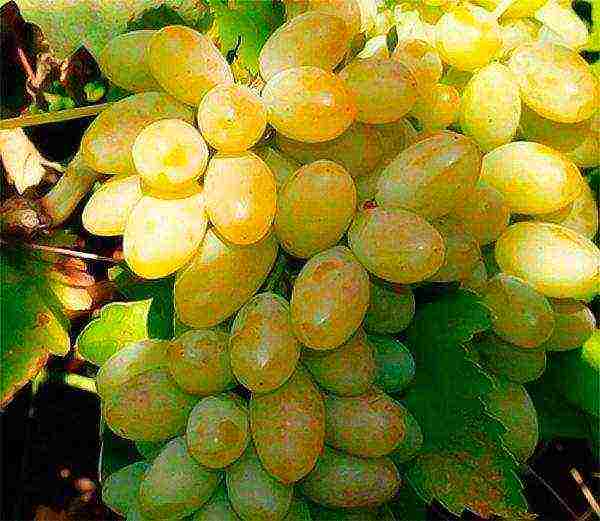 Frumoasa Albă grape variety
Frumoasa Albă grape variety
- A drip irrigation system is not so much recommended as necessary if the vineyard is vast and takes up a lot of space. Of course, for a single plant in a summer cottage, drip irrigation is not set, here you can do with simple timely watering. Plants need the most water during the growth period, and during the ripening of the fruits, it is better to cut them, otherwise the berries will be watery.
- Mulching is carried out on both large vineyards and small ones. It retains moisture, reduces the number of watering, fertilizing and simplifies weed harvesting.
- It is recommended to grow Muscat grapes on a trellis, to which, after the plant has grown, it can be tied up. If there is no trellis, you can use a simple support, like a peg, but it will not be able to hold the weight of the vineyard for a long time.
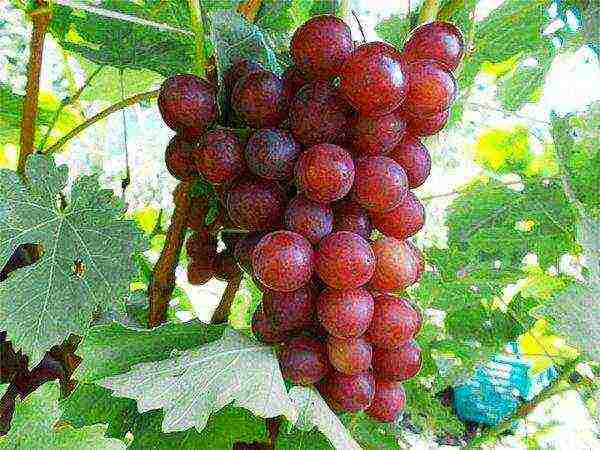 Grape variety Brilliant
Grape variety Brilliant - Pruning is carried out in early spring or autumn, before the cold weather. This is done with a simple pruner. It is necessary to remove all excess shoots, thin out the branches in the vineyard, otherwise the harvest for the next year will be greatly complicated.
- Loosening is carried out in the aisles and under the Muscat grape bushes. However, it is impossible to deeply bury the tool in the ground, so as not to damage the roots.This event is held approximately once every 1-3 weeks, depending on the climate, soil, irrigation.
- Spraying against pests and diseases is recommended annually in the fall for prevention or in early spring. Throughout the year, it is important to monitor the quality of the culture (leaves, vines, bunches) and in which case, without delaying, carry out treatment with fungicides or insecticides such as Paracelsus, Topaz, Shavit, Falcon, Sharpei, Horus, Break, Quadris, Aliot, Sirocco.
- Before winter, it is necessary to carry out measures to shelter the grapes. In the middle and northern regions, it is held every year, as winters in these areas can be unpredictable.
VIDEO - Grapes Shiny
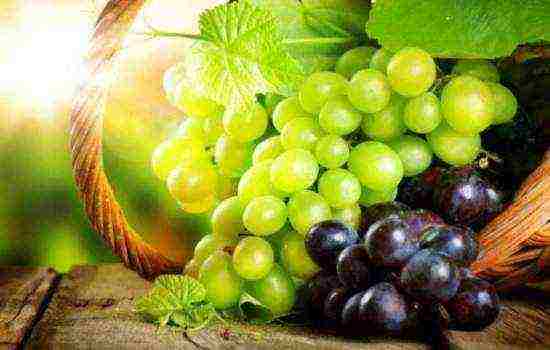
The grapes have become very popular among gardeners. A wide variety of varieties only fuels interest in this crop. It is worth planting a bush of grapes on your site, and you will definitely want to try other varieties of berries. That is why the collections of many winegrowers have more than 200 items. In summer cottages, where many different berry and fruit crops grow, there will definitely be a place for three or four bushes of grapes.
Types and types of grape varieties
In order to choose the best grape varieties, it is necessary to determine which type of this crop you prefer. There are several classifications:
1. Purpose of the variety. There are three large subgroups: table, technical and raisin-raisin grapes.
2. According to the ripening time of berries, grape varieties are divided into eight groups: very early (105-115 days) - the first group ... very late (165 and more days) - the eighth.
3. There is a division based on external features. The grape varieties are divided into three types: black, white and red grapes. The size of the berries of the variety and the weight of the brush are taken into account.
It should be remembered that there are varieties that are suitable both for fresh consumption and for processing. Such grapes are called table-technical or universal. There are more than 5,000 varieties of this crop in the world, about 2,200 of which are bred in Russia and the CIS countries.
The best varieties of table-type grapes
The Kroshka variety, despite the name, is a very large grape. Berries weighing up to 16 g turn dark purple when fully ripe. The brush can weigh up to 1.5 kg. The berry is crispy, has a pleasant balanced taste, ripens within 115-120 days, therefore the variety belongs to the very early group. The shape of the fruit is round, the density is medium.
On each vine, it is worth leaving 5-8 fruit eyes so that the vine does not break under the weight of the brushes. The optimal number of bunches per plant is 30-35, then all the grapes ripen well. "Kroshka" is a plant with bisexual flowers, therefore, to get a good harvest, it is enough to plant one bush on the site. Covering variety. Sleeping fruit bud can withstand temperatures down to -20 ° C.
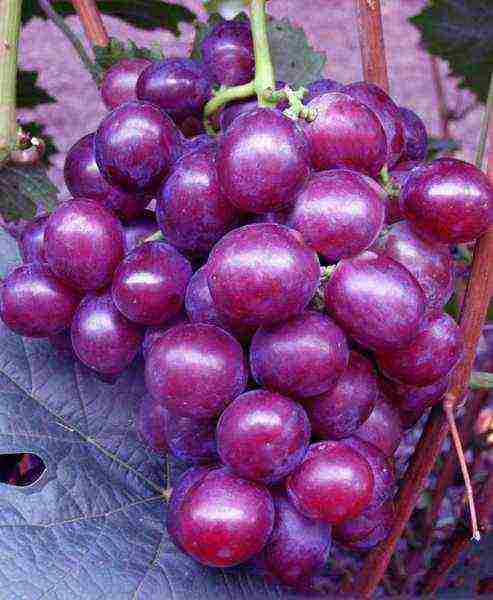
The best grape varieties: photo of the Kroshka variety
The "Legend of Aksai" variety can be referred to the best grape varieties. The fruits of this variety are slightly pink in color, their shape is elongated, the length of the berry is over 30 mm. The weight of the bunch can be up to 2 kg. The taste of the fruit is sweet, but not sugary, with a special flavor unlike any other grape.
It is believed that the Legend of Aksai is an improved form of the Julian variety. The vine is stronger, the berries are larger, and the resistance to diseases is much higher. The growth rate of the bush is very high. In the first year after planting, it reaches a height of 40-60 cm. In the third year, fruiting begins in full force, and the weight of the bunch reaches 2 kg and more.
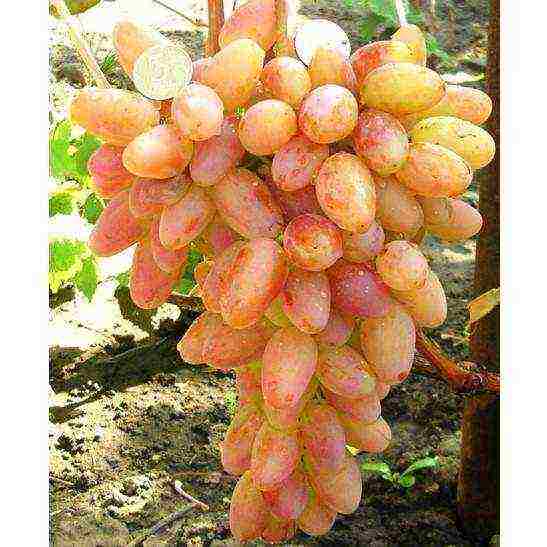
Grapes "Libya"
It is worth noting the Rumba grape variety. It is considered to be very early, it can withstand temperatures up to -18 ° C, therefore "Rumba" is a covering variety. A distinctive feature of the variety: the grapes begin to bear fruit as early as the second year after planting. With proper care, the weight of the hand reaches 1.5 kg.
An interesting feature of the variety is that it has two forms. They differ only in color. Rumba can be completely ruby in color or yellow with a ruby hue. The fruits are oval, large, the size of a five-ruble coin. The transportability of grapes is very high. The taste is slightly tart, very sweet, the berry is crispy and juicy.
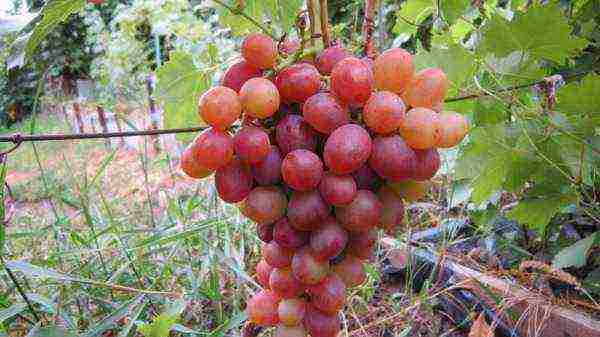
Photos of the best grape varieties: "Rumba" variety, yellow subspecies
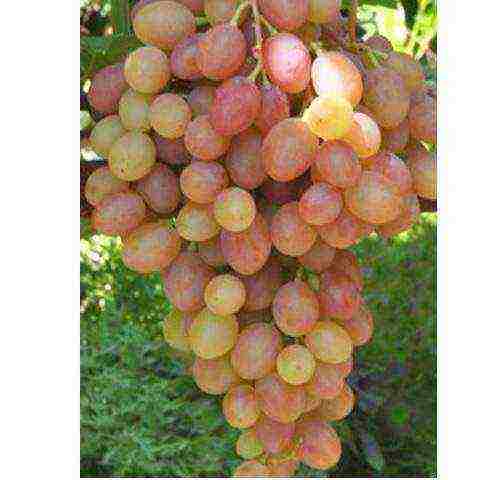
Photos of the best grape varieties: Rumba variety, pink subspecies
The grape that deserves your attention is "Tason". The variety is quite old, but does not lose its relevance. The grapes are large, weighing from 1 to 1.5 kg. The grapes are white, skin color with a light amber sun tan. The weight of one berry is 7-9 g. The taste is very sweet with a pronounced nutmeg hue. The bones are small, almost invisible.
The bush can withstand temperatures down to -22 ° C. The berries ripen in 100-110 days. "Tason" is considered one of the most delicious early grape varieties. Usually 30 clusters are left on one plant.
The variety is highly transportable. Due to its high early maturity, it is one of the first to appear on the shelves. Due to its excellent taste, "Tason" occupies a leading position among commercial grape varieties.
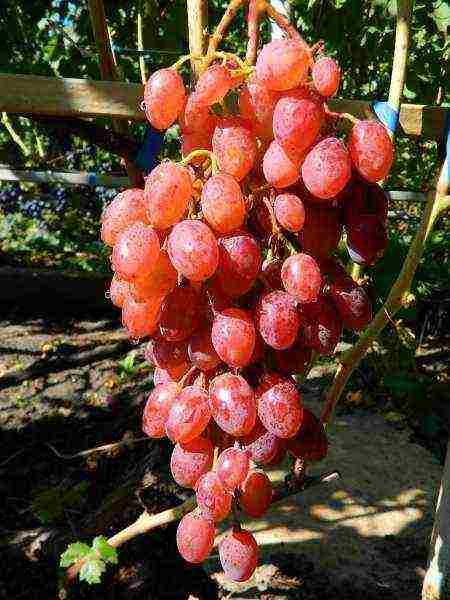
Grape varieties "Tason" photo
Review of the best raisin-raisin grape varieties
Recently, American breeding raisins are gaining great popularity in Russia. One of the best grape varieties of the raisin-raisin type is "Spartan". The weight of the brush reaches 600 g. The fruits are suitable both for processing into raisins or wine, and for fresh consumption. The grape is white, its taste is sweet and sour with a slight hint of nutmeg.
The variety winters well on the gazebo, as it can withstand frosts up to 35 ° C. The plant is highly resistant to fungal diseases. Loves sunny places, but can grow in partial shade.
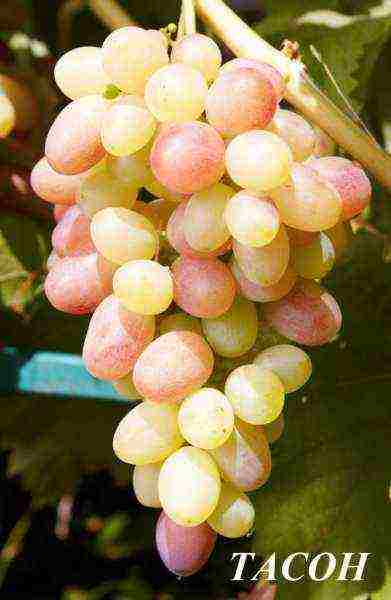
Kishmishno-raisin grapes of the "Spartan" variety
Another excellent seedless grape is the Reliance Pink Siddles. The berries are bright pink, rounded, slightly flattened at the bottom. The weight of one berry is 3 g, the weight of the brush is 400-500 g, up to 40 brushes can be left on one adult bush.
The taste of the berries is sweet, and the aroma has a slight hint of labrus. Due to the high sugar content, the berries make excellent raisins. Also, this variety is used in the preparation of red semi-sweet or dessert wine to give a ruby color to the finished drink.

The best grape varieties: photo of the "Reliance Pink Siddles" variety
Review of the best grape varieties for winemaking
The Black Pearl variety is ideal for making red Muscat wine. Withstands frosts up to 26 ° С. Fruits are small, bright blue. The taste has a strongly pronounced nutmeg hue, the taste itself is sour, therefore grapes are often used in the preparation of dry wine.
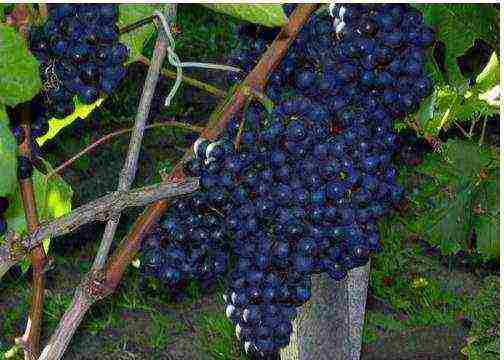
Grape variety "Black Pearl" photo
An excellent dessert wine can be made from Livadia Black grapes. The taste contains light notes of nutmeg. When fully ripe, the berry turns dark blue. The wine from this variety turns out to be an amazing ruby color. The taste of the finished drink contains fruity notes.
Initially, the variety was cultivated only in the Crimea, but the winegrowers managed to significantly expand the geography of cultivation. The bushes can withstand frosts up to 26 ° C without loss of yield. An important feature of the variety is the loss of taste when overripe. Therefore, the crop must be harvested in a timely manner.
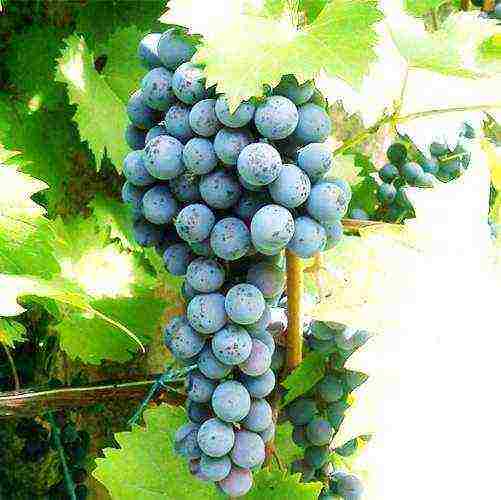
Wine grapes "Black Livadia"
The Dublyansky variety is one of the best grape varieties for making white Muscat wine. The color of the ripe berry is amber, sometimes with a pale pink tint. The skin is thin and the flesh is fleshy and aromatic.
Dormant buds do not freeze at -31 ° C. Therefore, this variety is suitable for growing in climates with cold winters. The bush grows well in partial shade.Ripe berries can be on the bush for up to two weeks, so the harvest is extended over time.
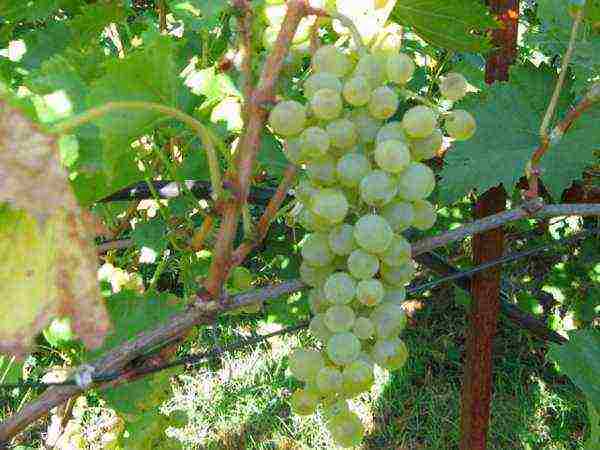
Grapes "Dublyansky", photos of the best grape varieties

